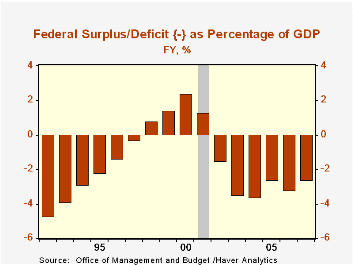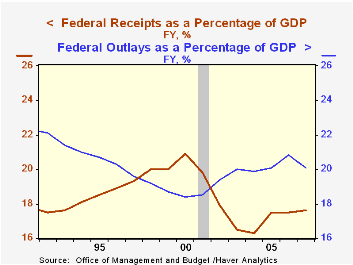 Global| Sep 14 2006
Global| Sep 14 2006U.S. Budget Deficit Deteriorated As Expected
by:Tom Moeller
|in:Economy in Brief
Summary
The August U.S. federal government budget deficit of $64.6B was double the July shortfall and deeper than August of last year. The figure compared favorably, however, to Consensus expectations for a $67.0B deficit, elevated due to [...]

The August U.S. federal government budget deficit of $64.6B was double the July shortfall and deeper than August of last year. The figure compared favorably, however, to Consensus expectations for a $67.0B deficit, elevated due to calendar quirks.
The August shortfall pulled the eleven month fiscal year 2006 deficit to $304.3B, improved versus a deficit of $354.1B for the first eleven months of FY 2005.
The FY'06 budget deficit estimate of $295.8B offered last month by the Office of Management & Budget in its Mid-Session Review looks conservative. During the last several years the Gov't has run a surplus between $25B and $65B during September.
Net revenues grew 11.7% versus the first eleven months of FY'05. Individual income tax receipts (44% of total receipts) grew 12.4% as withheld taxes rose 7.9%, due to growth in employment, and non-withheld taxes surged 20.8%. Corporate income taxes (13% of total receipts) surged 29.0% as corporate profits grew. Estate & gift taxes increased by 14.2% while social insurance & retirement receipts grew 5.7%.
U.S. net outlays grew 7.6% compared with the first eleven months of FY'05. Defense spending (19% of total outlays) grew 6.0%. Medicare expenditures (12% of outlays) advanced 13.7% and social security spending (21% of outlays) rose 4.7%. Higher interest rates boosted the government's interest expense by 22.2% y/y to $212.9B so far this fiscal year.
| US Government Finance | August | July | Y/Y | FY 2005 | FY 2004 | FY 2003 |
|---|---|---|---|---|---|---|
| Budget Balance | -$64.6B | -$33.2B | -$51.3B (8/05) |
-$318.3B | -$412.7B | -$377.6B |
| Net Revenues | $153.9B | $159.8B | -1.0% | 14.5% | 5.5% | -3.8% |
| Net Outlays | $218.5B | $213.0B | 5.7% | 7.8% | 6.2% | 7.4% |
Tom Moeller
AuthorMore in Author Profile »Prior to joining Haver Analytics in 2000, Mr. Moeller worked as the Economist at Chancellor Capital Management from 1985 to 1999. There, he developed comprehensive economic forecasts and interpreted economic data for equity and fixed income portfolio managers. Also at Chancellor, Mr. Moeller worked as an equity analyst and was responsible for researching and rating companies in the economically sensitive automobile and housing industries for investment in Chancellor’s equity portfolio. Prior to joining Chancellor, Mr. Moeller was an Economist at Citibank from 1979 to 1984. He also analyzed pricing behavior in the metals industry for the Council on Wage and Price Stability in Washington, D.C. In 1999, Mr. Moeller received the award for most accurate forecast from the Forecasters' Club of New York. From 1990 to 1992 he was President of the New York Association for Business Economists. Mr. Moeller earned an M.B.A. in Finance from Fordham University, where he graduated in 1987. He holds a Bachelor of Arts in Economics from George Washington University.
More Economy in Brief
 Global| Feb 05 2026
Global| Feb 05 2026Charts of the Week: Balanced Policy, Resilient Data and AI Narratives
by:Andrew Cates






